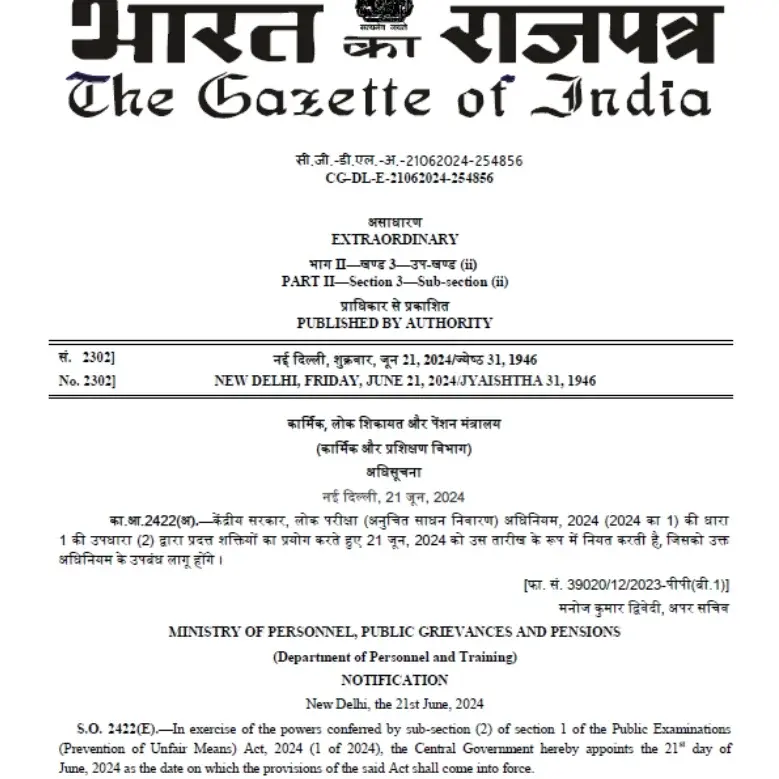Public Examinations (Prevention of Unfair Means) Bill, 2024)
- M.R Mishra

- Jun 22, 2024
- 4 min read
The Public Examinations (Prevention of Unfair Means) Bill, 2024 aims to prevent unfair practices in public examinations and ensure fair conduct of these exams. Below are the key points from the bill:
Title and Commencement: This Act is called the Public Examinations (Prevention of Unfair Means) Act, 2024.
It will come into force on a date appointed by the Central Government through an official notification.
Definitions:
The Act provides definitions for various terms such as public examination, public examination authority, unfair means, service provider, and more.
Public examination refers to any exam conducted by a public examination authority, specified in the schedule or notified by the Central Government.
Provisions and Penalties:
The Act outlines what constitutes unfair means during public examinations, including cheating, impersonation, leakage of question papers, and use of unauthorized electronic devices.
Strict penalties are prescribed for individuals and institutions found guilty of using or facilitating unfair means. This includes imprisonment and fines.

Responsibilities and Duties:
Public examination authorities are required to take measures to prevent unfair means, including the use of technology and thorough scrutiny of examination processes.
They must ensure the integrity of examination centers and maintain security protocols to prevent any malpractice.
Role of Service Providers:
Service providers engaged by public examination authorities must adhere to prescribed standards and procedures to prevent unfair means.
They are held accountable for any breaches of conduct during the examination process.
Enforcement and Implementation:
The Act empowers designated authorities to investigate and take action against instances of unfair means.
It includes provisions for the Central Government to make rules for effective implementation of the Act.
Miscellaneous:
The Act also includes various miscellaneous provisions such as the power to remove difficulties, and it details the process for amendments and notifications related to the Act.
CHAPTER III
PUNISHMENT FOR OFFENCES
9. All offences under this Act, shall be cognizable, non-bailable and
non-compoundable.
10. (1) Any person or persons resorting to unfair means and offences under
this Act, shall be punished with imprisonment for a term not less than three years
but which may extend to five years and with fine up to ten lakh rupees.
In case of default of payment of fine, an additional punishment of imprisonment shall be imposed, as per the provisions of the Bharatiya Nyaya Sanhita, 2023:
Provided that until the Bharatiya Nyaya Sanhita, 2023 is brought into force,
the provisions of the Indian Penal Code, shall be applicable in place of the said
Act.
(2) The service provider shall also be liable to be punished with imposition
of a fine up to one crore rupees and proportionate cost of examination shall also
be recovered from such service provider and he shall also be barred from being
assigned with any responsibility for the conduct of any public examination for a
period of four years.
(3) Where it is established during the investigation that offence under this
Act has been committed with the consent or connivance of any Director, Senior
Management or the persons in-charge of the service provider firm, he shall be liable
for imprisonment for a term not less than three years but which may extend to ten
years and with fine of one crore rupees. In case of default of payment of fine, an
additional punishment of imprisonment shall be imposed as per the provisions of
the Bharatiya Nyaya Sanhita, 2023:
Provided that until the Bharatiya Nyaya Sanhita, 2023 is brought into force,
the provisions of the Indian Penal Code, shall be applicable in place of the said
Act.
(4) Nothing contained in this section shall render any such person liable to
any punishment under the Act, if he proves, that the offence was committed without
his knowledge and that he exercised all due diligence to prevent the commission
of such offence.
11. (1) If a person or a group of persons including the examination authority
or service provider or any other institution commits an organised crime, he shall
be punished with imprisonment for a term not less than five years but which may
extend to ten years and with fine which shall not be less than one crore rupees. In
case of default of payment of fine, an additional punishment of imprisonment shall
be imposed as per the provisions of the Bharatiya Nyaya Sanhita, 2023:
Provided that until the Bharatiya Nyaya Sanhita, 2023 is brought into force, the
provisions of the Indian Penal Code, shall be applicable in place of the said Act.
(2) If an institution is involved in committing an organised crime, its property
shall be subjected to attachment and forfeiture and proportionate cost of
examination shall also be recovered from it.
CHAPTER IV
INQUIRY AND INVESTIGATION
12. (1) An officer not below the rank of Deputy Superintendent of Police or Assistant Commissioner of Police shall investigate any offence under this Act.
(2) Notwithstanding anything contained in sub-section (1), the Central Government shall have the powers to refer the investigation to any Central Investigating Agency.
Cognizable offences. Punishment for offences under this Act. Organised crimes. Officers empowered to
investigate.
This bill represents a comprehensive effort to uphold the integrity of public examinations in India by establishing clear guidelines and stringent penalties for malpractice.







Comments